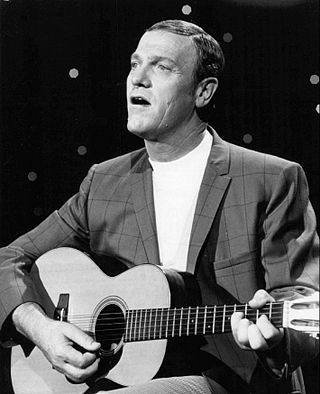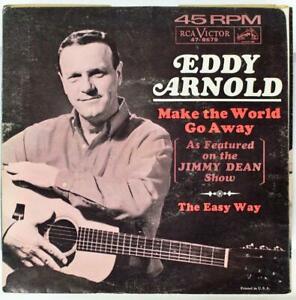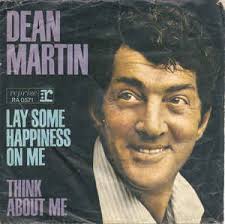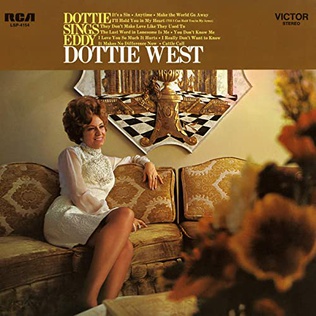Somebody Like Me may refer to:

Richard Edward Arnold was an American country music singer. He was a Nashville sound innovator of the late 1950s, and scored 147 songs on the Billboard country music charts, second only to George Jones. He sold more than 85 million records. A member of the Grand Ole Opry and the Country Music Hall of Fame, Arnold ranked 22nd on Country Music Television's 2003 list of "The 40 Greatest Men of Country Music."

Jack Walter Keller was an American composer, songwriter and record producer. He co-wrote, with Howard Greenfield and others, several pop hits in the late 1950s and early 1960s, including "Just Between You and Me", "Everybody's Somebody's Fool", "My Heart Has a Mind of Its Own", "Venus in Blue Jeans" and "Run to Him". He also wrote the theme songs for TV series including Bewitched and Gidget, and later worked in Los Angeles – where he wrote for, and produced, The Monkees – and in Nashville.
"I Really Don't Want to Know" is a popular song written by Don Robertson (music) Howard Barnes (lyrics). The song was published in 1953.

"You Don't Know Me" is a song written by Eddy Arnold and Cindy Walker in 1955. "You Don't Know Me" was first recorded by Arnold that year and released as a single on April 21, 1956, on RCA Victor. The best-selling version of the song is by Ray Charles, who took it to number 2 on the Billboard Hot 100 chart in 1962, after releasing the song on his number 1 album Modern Sounds in Country and Western Music. The first version of the song to make the Billboard charts was by Jerry Vale in 1956, peaking at number 14 on the pop chart. Arnold's version charted two months later, released as an RCA Victor single, 47–6502, backed with "The Rockin' Mockin' Bird", which reached number 10 on the Billboard country chart. Cash Box magazine, which combined all best-selling versions at one position, included a version by Carmen McRae that never appeared in the Billboard Top 100 Sides listing.

"Misty Blue" is a song written by Bob Montgomery that has been recorded and made commercially successful by several music artists. Although Montgomery wrote the song for a different artist in mind, it was brought first to the attention of Wilma Burgess in 1966. It was recorded by Eddy Arnold the following year, both versions were top 5 Country Hits. A decade later, blues artist Dorothy Moore released the highest-charting version of the song and it reached the top ten in several different radio formats. Following Moore's revival of the track, numerous artists re-covered the tune, including country artist Billie Jo Spears. Spears's version would also go on to become a successful single release. Numerous other artists and musicians of different genres have recorded their own versions of "Misty Blue". The song is now considered both a country music and blues standard.

"Make the World Go Away'" is a country pop song composed by Hank Cochran. It has become a Top 40 popular success three times: for Timi Yuro (1963), Eddy Arnold (1965), and the brother-sister duo Donny and Marie Osmond (1975). The original version of the song was recorded by Ray Price in 1963. and popularized again by Mickey Gilley in (1999) has remained a country-crooner standard ever since.
Wayne Carson, sometimes credited as Wayne Carson Thompson, was an American country musician, songwriter, and record producer. He played percussion, piano, guitar, and bass. His most famous songs as a writer include "The Letter", "Neon Rainbow", "Soul Deep", and "Always on My Mind".
You Don't Know Me or U Don't Know Me may refer to:

"Then You Can Tell Me Goodbye" is a song written by John D. Loudermilk. It was first released in 1962 by Don Cherry, as a country song and again as a doo-wop in 1967 by the group The Casinos on its album of the same name, and was a number 6 pop hit that year. The song has since been covered by Eddy Arnold, whose version was a number 1 country hit in 1968, and by Neal McCoy, whose version became a Top 5 country hit in 1996.
"Bouquet of Roses" is a 1948 song written by Steve Nelson (music) and Bob Hilliard (lyrics). It was originally recorded by Eddy Arnold and his Tennessee Plow Boys and his Guitar in Chicago on May 18, 1947. It was released by RCA Victor as catalogue number 20-2806 and by EMI on the His Master's Voice label as catalogue numbers BD 1234 and IM 1399. "Bouquet of Roses" was Eddy Arnold's third number one in a row on the Juke Box Folk Record chart and spent 19 weeks on the Best Selling Folk Records chart. In 1949, when RCA Victor introduced its new 45 RPM single format this record was among seven initial releases and the first in the Country and Western category. Arnold would re-record "Bouquet of Roses" several times during his career.
"Somebody Like Me" is a 1966 single by Eddy Arnold. "Somebody Like Me" was a number one country song spending four weeks at the top spot and a total of eighteen weeks on the chart.
"The Tip of My Fingers", also titled "The Tips of My Fingers", is a song written and originally recorded by American country music singer Bill Anderson. First included on his 1962 album Bill Anderson Sings Country Heart Songs, the song was a Top Ten country single for him in 1960.
"Just Call Me Lonesome" is a song written by Rex Griffin and first recorded by Eddy Arnold in 1955, when it reached number two on the U.S. country singles chart. "Just Call Me Lonesome" subsequently appeared on albums by numerous recording artists:
Just Call Me Lonesome may refer to:

I Want to Go with You is a studio album by American country music singer Eddy Arnold released by RCA Victor in 1966. It reached #1 in the US country charts and #26 in the Billboard 200 charts. Released as a single in early 1966, the title track "I Want to Go with You" peaked at #36 on the Billboard Hot 100 chart. It was more successful with country and adult contemporary audiences, reaching #1 on both the Billboard country chart for six weeks and the easy listening chart for three weeks.

"Lay Some Happiness on Me" is a song that was first released by Eddy Arnold in 1966, on the album Somebody Like Me. The song became a hit in 1967, when it was released by Dean Martin and by Bobby Wright.
Treat Me Like a Lady may refer to:

Right for the Flight is the ninth studio album by American country music singer Eddy Raven. It was released in 1991 by Capitol Records Nashville.

Dottie Sings Eddy is a studio album by American country music artist Dottie West. It was released in March 1969 on RCA Victor Records. The album was co-produced by Chet Atkins and Danny Davis. The project was a tribute to country artist, Eddy Arnold, whom West considered an inspiration in her career. West covered 11 tracks that were originally recorded by Arnold throughout his career.

Somebody Like Me is an album by American country music singer Eddy Arnold. It was released by RCA Victor in 1966.